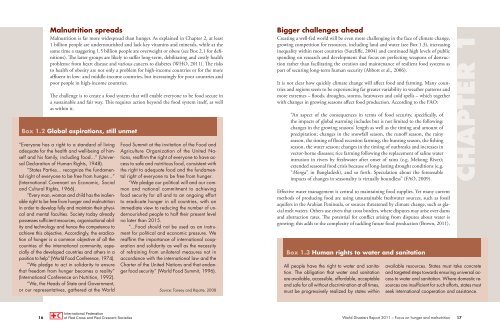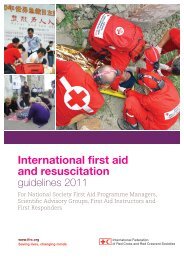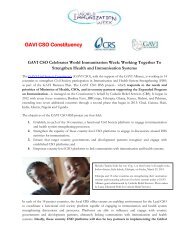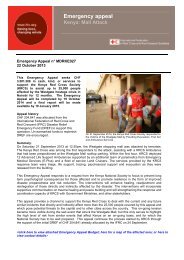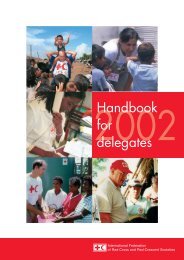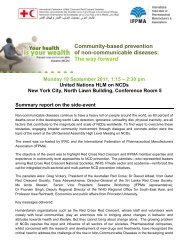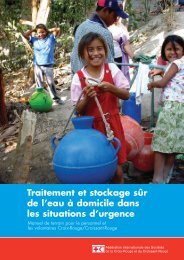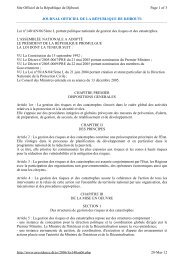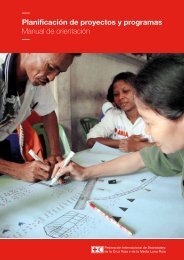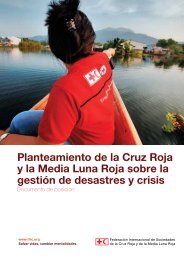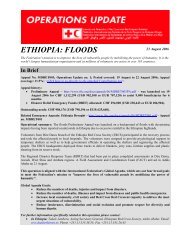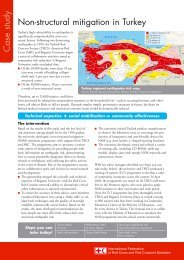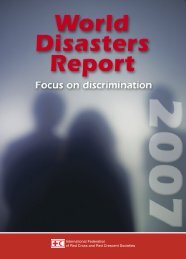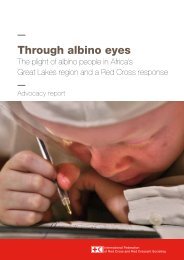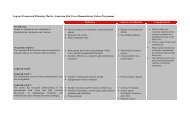World Disasters Report - International Federation of Red Cross and ...
World Disasters Report - International Federation of Red Cross and ...
World Disasters Report - International Federation of Red Cross and ...
Create successful ePaper yourself
Turn your PDF publications into a flip-book with our unique Google optimized e-Paper software.
16<br />
Malnutrition spreads<br />
Malnutrition is far more widespread than hunger. As explained in Chapter 2, at least<br />
1 billion people are undernourished <strong>and</strong> lack key vitamins <strong>and</strong> minerals, while at the<br />
same time a staggering 1.5 billion people are overweight or obese (see Box 2.1 for definitions).<br />
The latter groups are likely to suffer long-term, debilitating <strong>and</strong> costly health<br />
problems: from heart disease <strong>and</strong> various cancers to diabetes (WHO, 2011). The risks<br />
to health <strong>of</strong> obesity are not only a problem for high-income countries or for the more<br />
affluent in low- <strong>and</strong> middle-income countries, but increasingly for poor countries <strong>and</strong><br />
poor people in high-income countries.<br />
The challenge is to create a food system that will enable everyone to be food secure in<br />
a sustainable <strong>and</strong> fair way. This requires action beyond the food system itself, as well<br />
as within it.<br />
Box 1.2 Global aspirations, still unmet<br />
“Everyone has a right to a st<strong>and</strong>ard <strong>of</strong> living<br />
adequate for the health <strong>and</strong> well-being <strong>of</strong> himself<br />
<strong>and</strong> his family, including food...” (Universal<br />
Declaration <strong>of</strong> Human Rights, 1948).<br />
“States Parties... recognize the fundamental<br />
right <strong>of</strong> everyone to be free from hunger...”<br />
(<strong>International</strong> Covenant on Economic, Social<br />
<strong>and</strong> Cultural Rights, 1966).<br />
“Every man, woman <strong>and</strong> child has the inalienable<br />
right to be free from hunger <strong>and</strong> malnutrition<br />
in order to develop fully <strong>and</strong> maintain their physical<br />
<strong>and</strong> mental faculties. Society today already<br />
possesses sufficient resources, organisational ability<br />
<strong>and</strong> technology <strong>and</strong> hence the competence to<br />
achieve this objective. Accordingly, the eradication<br />
<strong>of</strong> hunger is a common objective <strong>of</strong> all the<br />
countries <strong>of</strong> the international community, especially<br />
<strong>of</strong> the developed countries <strong>and</strong> others in a<br />
position to help” (<strong>World</strong> Food Conference, 1974).<br />
“We pledge to act in solidarity to ensure<br />
that freedom from hunger becomes a reality”<br />
(<strong>International</strong> Conference on Nutrition, 1992).<br />
“We, the Heads <strong>of</strong> State <strong>and</strong> Government,<br />
or our representatives, gathered at the <strong>World</strong><br />
Food Summit at the invitation <strong>of</strong> the Food <strong>and</strong><br />
Agriculture Organization <strong>of</strong> the United Nations,<br />
reaffirm the right <strong>of</strong> everyone to have access<br />
to safe <strong>and</strong> nutritious food, consistent with<br />
the right to adequate food <strong>and</strong> the fundamental<br />
right <strong>of</strong> everyone to be free from hunger.<br />
“We pledge our political will <strong>and</strong> our common<br />
<strong>and</strong> national commitment to achieving<br />
food security for all <strong>and</strong> to an ongoing effort<br />
to eradicate hunger in all countries, with an<br />
immediate view to reducing the number <strong>of</strong> undernourished<br />
people to half their present level<br />
no later than 2015.<br />
“...Food should not be used as an instrument<br />
for political <strong>and</strong> economic pressure. We<br />
reaffirm the importance <strong>of</strong> international cooperation<br />
<strong>and</strong> solidarity as well as the necessity<br />
<strong>of</strong> refraining from unilateral measures not in<br />
accordance with the international law <strong>and</strong> the<br />
Charter <strong>of</strong> the United Nations <strong>and</strong> that endanger<br />
food security” (<strong>World</strong> Food Summit, 1996).<br />
Source: Tansey <strong>and</strong> Rajotte, 2008<br />
Bigger challenges ahead<br />
Creating a well-fed world will be even more challenging in the face <strong>of</strong> climate change,<br />
growing competition for resources, including l<strong>and</strong> <strong>and</strong> water (see Box 1.3), increasing<br />
inequality within most countries (Sutcliffe, 2004) <strong>and</strong> continued high levels <strong>of</strong> public<br />
spending on research <strong>and</strong> development that focus on perfecting weapons <strong>of</strong> destruction<br />
rather than facilitating the creation <strong>and</strong> maintenance <strong>of</strong> resilient food systems as<br />
part <strong>of</strong> securing long-term human security (Abbott et al., 2006).<br />
It is not clear how quickly climate change will affect food <strong>and</strong> farming. Many countries<br />
<strong>and</strong> regions seem to be experiencing far greater variability in weather patterns <strong>and</strong><br />
more extremes – floods, droughts, storms, heatwaves <strong>and</strong> cold spells – which together<br />
with changes in growing seasons affect food production. According to the FAO:<br />
“An aspect <strong>of</strong> the consequences in terms <strong>of</strong> food security, specifically, <strong>of</strong><br />
the impacts <strong>of</strong> global warming includes but is not limited to the following:<br />
changes in the growing seasons’ length as well as the timing <strong>and</strong> amount <strong>of</strong><br />
precipitation; changes in the snowfall season, the run<strong>of</strong>f season, the rainy<br />
season, the timing <strong>of</strong> flood recession farming, the hunting season, the fishing<br />
season, the water season; changes in the timing <strong>of</strong> outbreaks <strong>and</strong> increases in<br />
vector-borne diseases; rice farming following the replacement <strong>of</strong> saline water<br />
intrusion in rivers by freshwater after onset <strong>of</strong> rains (e.g. Mekong River);<br />
extended seasonal food crisis because <strong>of</strong> long-lasting drought conditions (e.g.<br />
“Monga” in Bangladesh), <strong>and</strong> so forth. Speculation about the foreseeable<br />
impacts <strong>of</strong> changes in seasonality is virtually boundless” (FAO, 2009).<br />
Effective water management is central to maintaining food supplies. Yet many current<br />
methods <strong>of</strong> producing food are using unsustainable freshwater sources, such as fossil<br />
aquifers in the Arabian Peninsula, or sources threatened by climate change, such as glacial<br />
melt waters. Others use rivers that cross borders, where disputes may arise over dams<br />
<strong>and</strong> abstraction rates. The potential for conflict arising from disputes about water is<br />
growing; this adds to the complexity <strong>of</strong> tackling future food production (Brown, 2011).<br />
Box 1.3 Human rights to water <strong>and</strong> sanitation<br />
All people have the right to water <strong>and</strong> sanitation.<br />
The obligation that water <strong>and</strong> sanitation<br />
are available, accessible, affordable, acceptable<br />
<strong>and</strong> safe for all without discrimination at all times,<br />
must be progressively realized by states within<br />
<strong>World</strong> <strong>Disasters</strong> <strong>Report</strong> 2011 – Focus on hunger <strong>and</strong> malnutrition 17<br />
CHAPTER 1<br />
available resources. States must take concrete<br />
<strong>and</strong> targeted steps towards ensuring universal access<br />
to water <strong>and</strong> sanitation. Where domestic resources<br />
are insufficient for such efforts, states must<br />
seek international cooperation <strong>and</strong> assistance.


